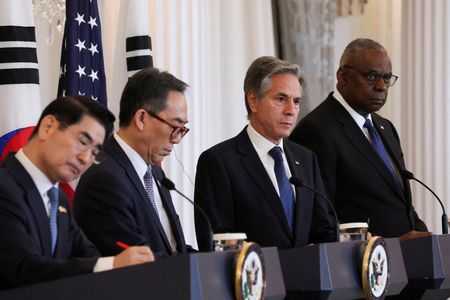By Jarrett Renshaw and Timothy Gardner
WASHINGTON (Reuters) -The United States and Japan on Wednesday announced a joint partnership to accelerate development and commercialization of nuclear fusion.
The partnership was unveiled as Japanese Prime Minister Fumio Kishida was in Washington for a summit with President Joe Biden.
U.S. Deputy Secretary of Energy David Turk and Japan’s minister of education, sports, science and technology, Masahito Moriyama, met in Washington on Tuesday to discuss fusion.
The partnership will focus on the scientific and technical challenges of delivering commercial fusion and expand work between U.S. and Japanese universities, national laboratories and private companies, the U.S. Department of Energy said.
Scientists, governments and companies have been trying for decades to harness fusion, the nuclear reaction that powers the sun, to provide carbon-free electricity. It can be replicated on Earth with heat and pressure using lasers or magnets to fuse two light atoms into a denser one, releasing large amounts of energy.
Unlike plants that run on fission, or splitting atoms, commercial fusion plants, if ever built, would produce little long-lasting radioactive waste.
Last year, scientists using laser beams at a U.S. national lab in California repeated a fusion breakthrough called ignition where for an instant the amount of energy coming from the fusion reaction surpassed that concentrated on the target.
Scientists estimated, however, that the net energy output of that experiment was only about 0.5% of the energy that went in to firing up the lasers. Even if the science is eventually worked out, there are regulatory, construction and siting hurdles in creating new fleets of power plants to replace parts of existing energy systems.
Late last year, Japan set up a fusion industry forum to commercialize the technology, with participants in engineering and energy companies. The forum is expected to make recommendations to Japan’s government about safety and technology standards and serve as a liaison for overseas projects.
A fusion industry group praised the partnership. “Fusion is too important for needless competition: like-minded countries should work together towards the common goal,” said Andrew Holland, the head of the Fusion Industry Association based in Washington.
Last December in Dubai, then-U.S. special climate envoy John Kerry launched an international plan involving 35 countries to boost fusion.
Japan and the U.S. will also agree during the summit to support sustainable aviation fuel, two sources with knowledge of the talks between the countries said.
(Reporting by Jarrett Renshaw in Philadelphia and Timothy Gardner in WashingtonEditing by Franklin Paul and Matthew Lewis)









